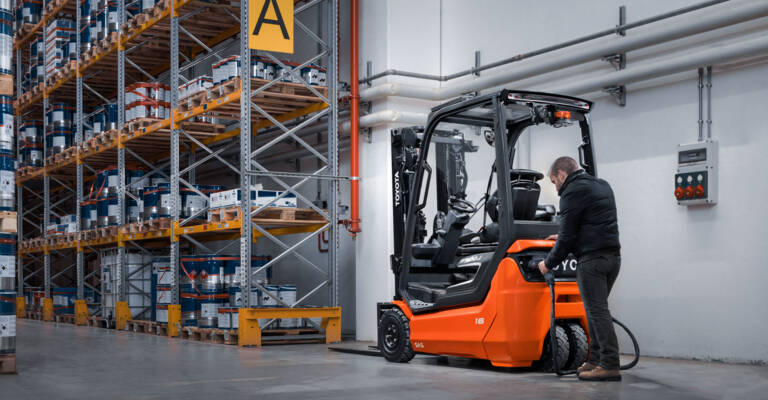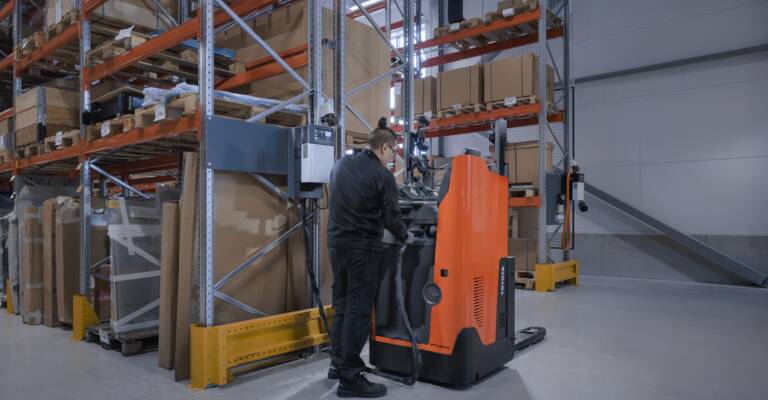Hydrogen fuel cell technology
What fuel cell technology means for your forklift
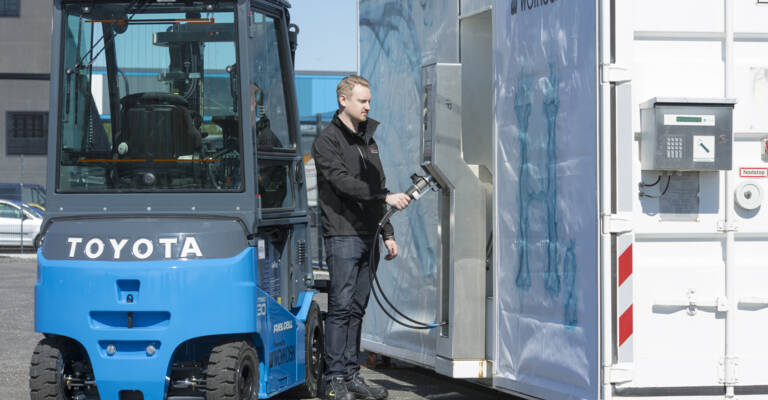
Across every industry, there is a drive to adopt low-carbon technologies, which in most cases means using electric power. As a result, there is a bigger demand for both electricity and the infrastructure that is used to supply it – think about how many electric car chargers have been installed at transport hubs, for example.
Warehouses want to adopt electric power, but they do not want to be limited by the capacity of the ‘grid’, or the time it takes to charge a battery. That is where fuel cell trucks come in. Run on hydrogen, they take 2-3 minutes to fully refuel, have zero emissions if green hydrogen is used, and the hydrogen can be easily stored on premises, giving you control over the supply.
90% of Toyota’s forklift range is electric, including lithium-ion battery-powered and hydrogen-powered trucks. In fact, Toyota’s experience with hydrogen forklifts stretches back for more than 15 years.
How does hydrogen fuel cell work on forklifts?
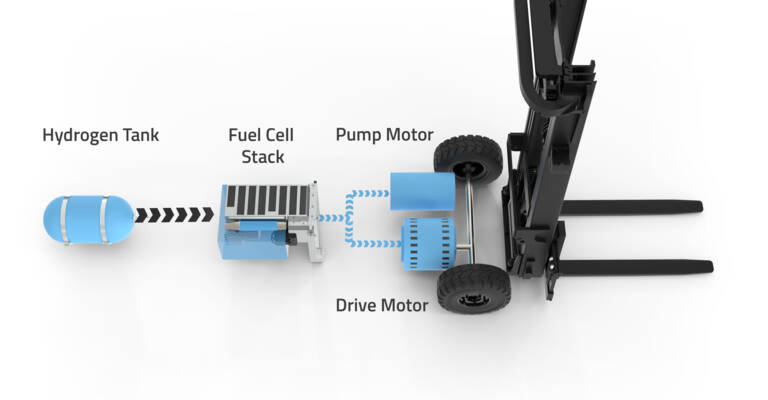
The fuel cell system on a forklift consists of the fuel cell stack, the 350-bar hydrogen tank, a small lithium-ion battery to temporarily store surplus energy, and a fan. All this is contained in a cast frame the size of a classic lead-acid battery and can be installed relatively easily in a conventional electric forklift.
Inside the fuel cell stack, the hydrogen is mixed with air, where it reacts with the oxygen in the air to produce water. During this chemical reaction, electrical energy is released; this energy is collected and used to drive the electric motors that power the forklift’s propulsion, lift and tilt systems.
Want to learn more about hydrogen fuel cell forklift trucks? Read our FAQs article>>
Should I use fuel cell trucks?
Unsure whether hydrogen is right for you? Just ask yourself this list of questions. If you answer ‘no’ to them all, you may want to investigate a different energy source. But the more ‘yes’ answers you give, the likelier it is that hydrogen fuel cell trucks are the best choice for your operation.
The self-assessment quiz
If you run a multi-shift operation where trucks are used constantly, finding time for battery charging can be a challenge. But with fuel cells taking just 2-3 minutes to refuel, it is easy to fit into a truck’s schedule.
Heavy-duty applications have high energy requirements, which means the trucks will need to refuel often. Here, fuel cell technology comes into its own, with the short refuelling cycle keeping downtime to a minimum.
Many companies have committed to reducing their CO2 emissions to a certain level. Fuel cell technology can be a huge step in this direction: when using green hydrogen, a fuel cell produces no emissions whatsoever.
A bigger on-site fleet with multiple types of vehicles can all be run off one hydrogen dispenser, saving you time, space, and costs.
Unlike lead-acid batteries, hydrogen fuel cells operate at low temperatures with no loss of efficiency.
Companies that already have other vehicles running on hydrogen can switch to fuel cell trucks quickly and start reaping the benefits immediately.
Where does the hydrogen come from?
Energy-grade hydrogen is obtained by separating it from the other elements in the molecules where it occurs (such as water, hydrocarbons, and biomass). The two most common methods for doing this are steam reforming and electrolysis. Of these, electrolysis is considered the cleanest process. If this electrolysis is powered by a renewable energy source (such as solar power or wind), the end product can qualify as ‘green hydrogen’.
Can I produce my own hydrogen?
It is possible to produce your own hydrogen on site using your own electrolyser. Alternatively, it can be supplied via lines on the roof or underground, or gas bottles or special trailers. This means storage and refuelling can take place indoors or outdoors.
Advantages of hydrogen fuel cells
Hydrogen fuel cell power has long been regarded as an environmentally friendly option – but today, it is a practical one too. Hydrogen fuel cell-powered trucks are:
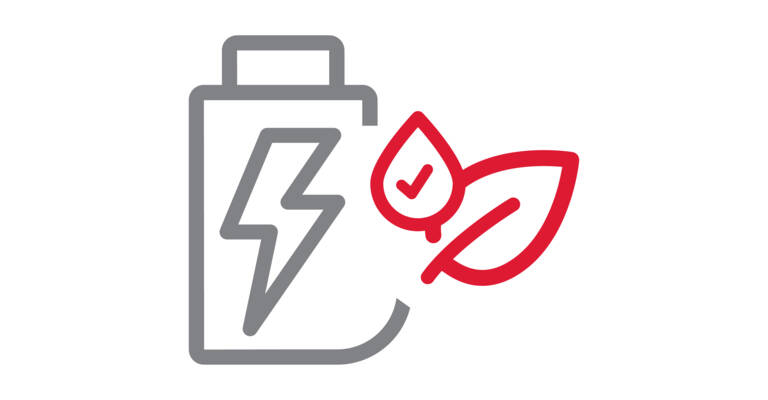
Sustainable
Trucks operate with zero emissions – as distilled water is the only waste product. Using ‘green hydrogen’ makes the entire hydrogen lifecycle carbon neutral. With no toxic chemicals, trucks are safe for operators.
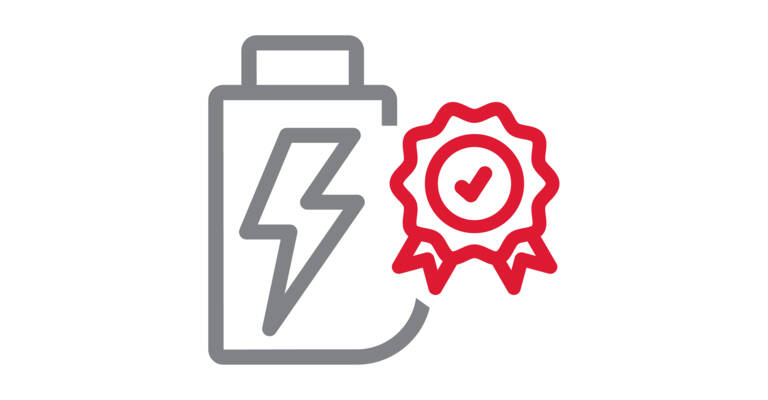
Reliable
Hydrogen fuel tanks have a long service life, with low maintenance requirements. There is no performance loss during use, and opportunistic fuelling is possible without harming battery life.
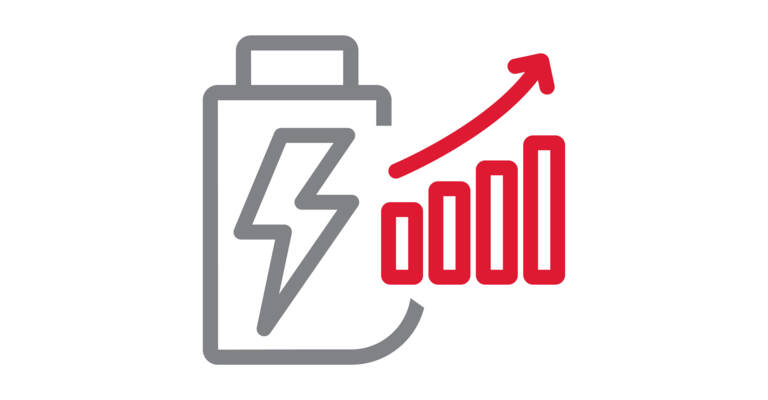
Productive
Refuelling takes only 2-3 minutes and there is no need for battery changes. Hydrogen can be stored in several different ways and does not need a dedicated cargo area or ventilation system. This makes hydrogen fuel cell a highly productive option.

Flexible
Refuelling can be done both outdoors and indoors, and at low temperatures at any time. Tanks can be retrofitted to existing trucks, and do not take up excessive space.
Does fuel cell pay off as an investment?
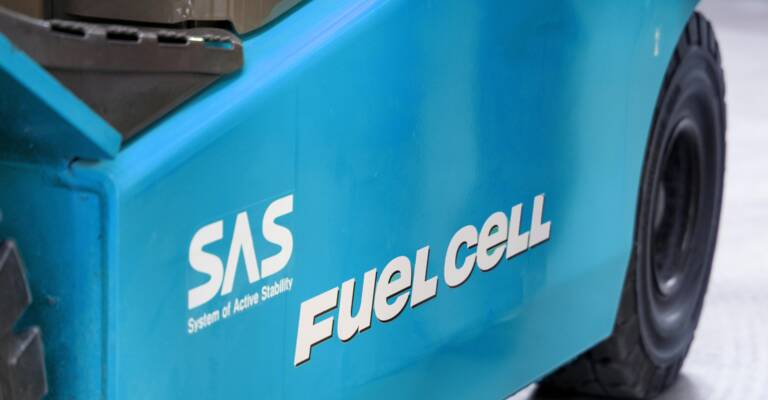
Switching to fuel cell trucks requires an up-front investment in the hydrogen infrastructure for your facility. That investment starts to pay itself back immediately through regular savings in operational costs. How long it takes to fully pay off depends on the nature of your operation – it’s worth analysing this carefully before deciding whether fuel cell is right for you.
When is hydrogen most successful?
In general, a fuel cell solution will make the most business sense for large fleets based at one location. Operations where trucks undergo multi-shift use, or frequent battery changes, will also see a quicker return.
However, there are other factors you may want to consider before making the switch. To ensure you are making the best choice, take the self-assessment quiz earlier on this page.
Fuel cell truck solutions
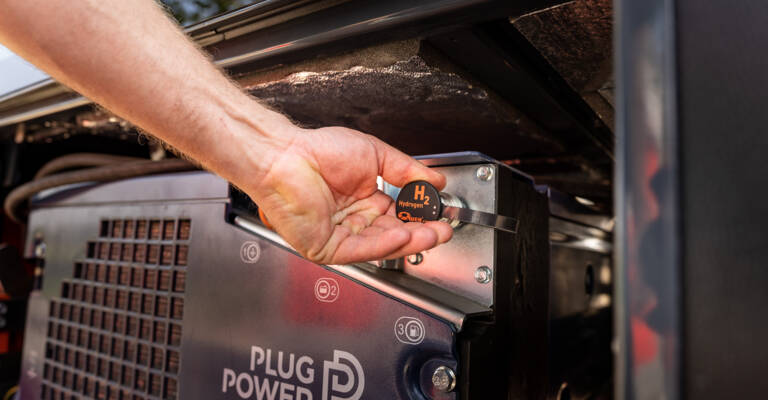
Around 90 percent of Toyota’s fleet of electric forklifts is currently available with fuel cell technology, and we are constantly growing our fuel cell truck range. We use hydrogen power in our own production facilities in Japan and Italy as well as with partners in France, Norway and Finland. From this practical experience, we have gained a first-hand knowledge of the requirements, opportunities and difficulties when it comes to installing hydrogen power. We pass this on to customers whenever we can.
Want to learn more about hydrogen fuel cell forklift trucks? Read our FAQ page>>
Want to know more?
Your local Toyota representative will be happy to talk you through our range and give you advice on how you can make fuel cell trucks work to your benefit.
Costumer story fuel cell trucks

The hydrogen-powered truck received some promising feedback and many positive reactions at AET:
'After using the truck, we can compare the characteristics of the hydrogen truck with the electrical forklift’s benefits: adjustable, rigorous in usage, agile, almost completely silent and no more exhaust fumes. Furthermore, after a long and especially productive day, we can immediately refuel the truck.'
Luc De Ben, Terminal Support Coordinator at AET
Read the full case study here>>

